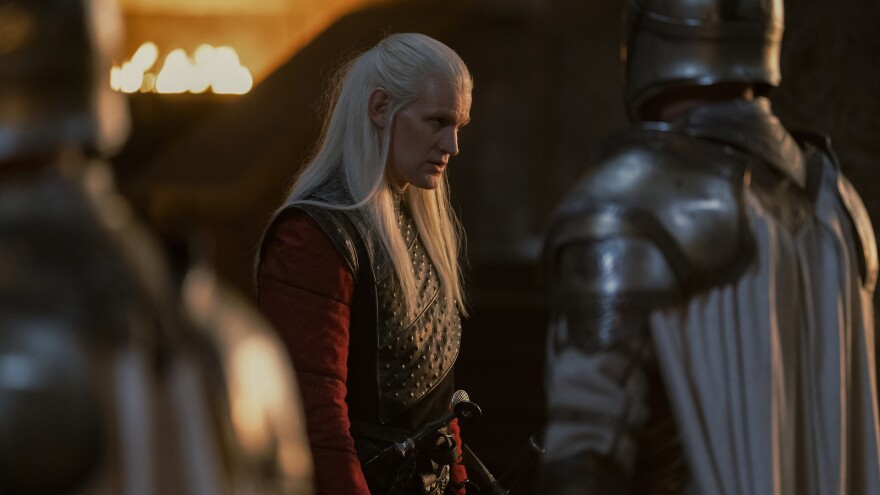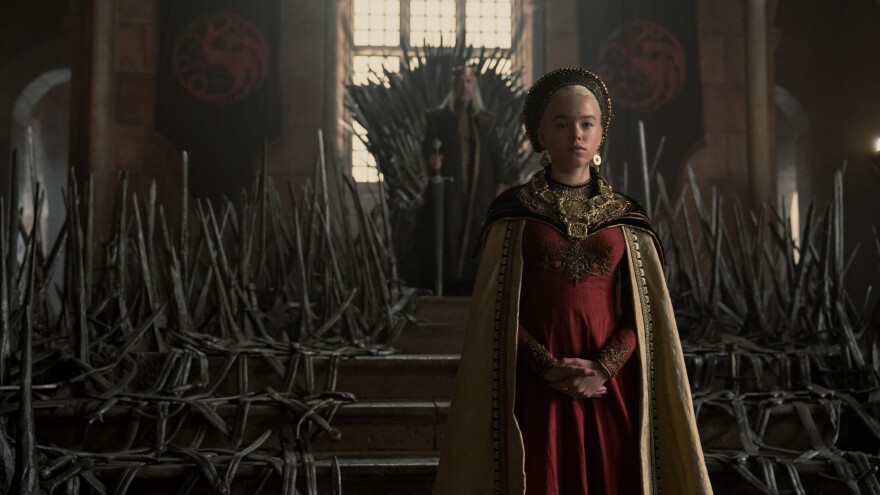Whether or not you, dear reader, should choose to dive into HBO's House of the Dragon when it debuts Sunday night depends entirely on your attitude toward the series it serves as a prequel to, Game of Thrones.
I recapped GoT for NPR, which meant I heard from folks who loved it and stuck with it to the end. (I'll be recapping House of the Dragon too, starting Sunday).
But mostly, and in far greater numbers, I heard from people who seemed inordinately eager to inform me that they weren't watching, or had abruptly stopped watching, or who only kept watching through gritted teeth, seething all the while.
They all had their reasons for the positions they took up, and they weren't as diverse as you might think. That got me thinking: on the eve of House of the Dragon's debut, perhaps I could be of service.
So let's do this: Simply scan the list below for the critique that best approximates your own attitude toward Game of Thrones, and find out how — or whether — House of the Dragon responds to it.
1. I loved Game of Thrones! Ate it up with a big ol' spoon! All the way through!
What, really? Wow, so you're the one. Uh. Okay then, just ... go nuts. You'll eat up House of the Dragon with that very same spoon. It's more of what you love. Enjoy!
2. I tried, I really did, but I just couldn't keep track of everything. All those names, all those places, all those competing factions. And why were so many of the characters a bunch of beardy, brown-haired, middle-aged white dudes who looked alike? How was that fair?
First off, House of the Dragon is set about 200 years before the events of Game of Thrones, so you don't need to worry about any of those beardy white dudes; they haven't been born yet.
Think of it this way: House of the Dragon is the story of a war over succession. It's the War of the Roses, basically. If you can follow Shakespeare's history plays, if you can read Wolf Hall, you can get this. Because where Game of Thrones depicted an extended jockeying for power among numerous kingdoms and Houses — Starks vs. Lannisters vs. Baratheons vs. Boltons vs. Pykes, etc. — on House of the Dragon, the main conflict takes place within a single family, so there's fewer competing factions to keep track of.
That's the good news. The bad news: Swap beardy, brown-haired, middle-aged white dudes for a lot of folk sporting the same flowing platinum wig, because the single family is question is the Targaryens. They're the ones with that white-blond hair, and the cheekbones. They tend to intermarry, and they have a kinship with dragons.

Y'all remember Daenerys Targaryen, from Game of Thrones. Played by the Emilia Clarke, she was the one in the less-than-convincing platinum wig, the Mother of Dragons. She spent most of the series in exile, working to build an army so she could take back the Iron Throne that her father, The Mad King, had lost. She was basically the last Targaryen.
House of the Dragon, conversely, is set back at the height of the Targaryen Dynasty, when the family is still the most powerful force in the world, because they're lousy with dragons.
3. I started watching Game of Thrones, but I couldn't stomach the violence. Not for me.
Then House of the Dragon is also not for you. Life in Westeros is even more nasty, brutish and short than it was in Game of Thrones, and the gore is just as intense. It doesn't all come in the same form — it's not all lopped heads and hacked limbs, though there's plenty of those. The first episode features a particularly grisly depiction of how dangerous childbirth can be, even in a world of magic.
4. Despite characters like Arya, Cersei and Sansa, Game of Thrones tended to treat women, especially background characters, as dehumanized objects to be leered at.
Yeah, the show came in for some fair critiques about that. And while there are still plenty of boobs and butts in House of the Dragon, especially in brothel scenes, it feels less gratuitous, more equal opportunity. Your mileage may vary, of course.
5. I liked Game of Thrones when it started out and stuck to palace intrigue and battles between kingdoms. But then it all became about the fantasy stuff — magic and dragons and snow zombies — and it lost me.
I don't know what to tell you, my guy, but it's right there in the name: House of the Dragon. This is all dragons, all the time, from the jump. So it's probably not for you.

6. Once the series went past the story that had been laid out in George R. R. Martin's novels, it lost me. Everything suddenly felt rushed and thin and unconvincing, and all the nuance of the books fell away.
This is, by far, the thing I heard from folks most often. And we don't need to re-litigate it here, but yeah: The showrunners of Game of Thrones leaned out over their skis. E.L. Doctorow famously said writing a novel is like driving at night with your headlights on — you can only see a few yards ahead of you, but it's enough to get you where you need to go. In the last couple of seasons of Game of Thrones, the showrunners drove with their headlights off.
But if you're worried about that happening with House of the Dragon, don't be. The series is based on a 2018 Martin book — Fire & Blood — with a pre-existing beginning, middle and definitive end. There will be no vamping; we're looking instead at a relatively straightforward act of adaptation.
I say "relatively" because Fire & Blood is presented not as a simple narrative but as a series of conflicting historical accounts, written in different styles from different points of view.
And while that makes for a fun read, television has more exacting demands. Things left deliberately and tantalizingly ambiguous in the book will need to get explicitly dramatized, one way or another. The showrunners are going to have pick a side and run with it.
In the end, of course, it's entirely up to you whether you're up for another visit to the Seven Kingdoms. Your last trip there was rough; I get that.
But just know that the place is under new management, and they certainly seem to want to provide you a more focused, more self-contained, more considered tourist experience than the old crew did.
Copyright 2022 NPR. To see more, visit https://www.npr.org.




